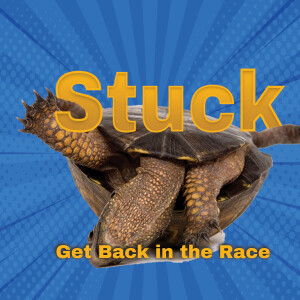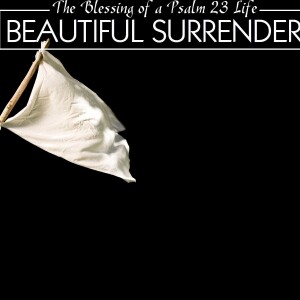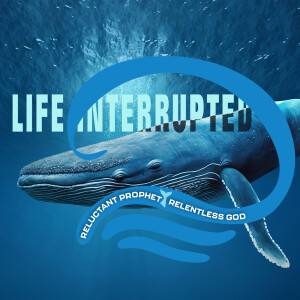Episodes

Tuesday Sep 19, 2023
Stuck | Part 2 | You Who | Chris Voigt
Tuesday Sep 19, 2023
Tuesday Sep 19, 2023
We are in week two of a new sermon series we’ve called, Stuck: Get Back in the Race. As we continue in our study this week, we’re going to take a look at who God says we are - beneath the labels, the job descriptions, the hats we wear and the roles we play. Strip all those things away and what’s left? What’s at the core of who you are? And how does that shape the way you live?
Having a clear understanding of who we are is essential for healthy growth. And there isn’t anyone who doesn’t need a reminder from time to time, about what is really true about us. It’s when we forget, that we are prone to getting stuck. Join us as we rewrite our labels and remember what is really true about who we are in Christ.
-----------------------------------
TAKE YOUR NEXT STEP
----------------------------------
Let us know that you were watching with us and you will be entered to receive a free prize by completing our Connection Card: http://dsf.church/ecard
Give Online: https://www.simplechurchgiving.net/App/Giving/dsf
Message Notes: https://www.dayspringfellowship.com/sermons
Like, comment & subscribe to stay updated!
Instagram: https://www.instagram.com/dayspringkeizer
Facebook: https://www.facebook.com/DayspringKeizer
YouTube: https://www.youtube.com/dayspringfellowship
Website: http://dsf.church
#dayspringkeizer #dayspringfellowship #2023sermon
___________________
Thanks for watching Dayspring Fellowship's worship service! At Dayspring Fellowship, we believe there is nothing more important than your spiritual growth.

Tuesday Sep 12, 2023
Stuck | Part 1 | The (UN)Comfort Zone | Chris Voigt
Tuesday Sep 12, 2023
Tuesday Sep 12, 2023
The (UN)comfort ZoneStuck: Get Back In the GameSeptember 10, 2023
Most people want to use their time well and spend it wisely. We value productivity, growth, health and happiness. We want life to be good; always moving up and to the right. But sooner or later, we all get sidelined – something breaks down, whether in us or around us, and we find ourselves stuck. Stuck can have a lot of different faces and look a lot of different ways. Which can sometimes make it difficult to recognize.
This Sunday we are beginning a new sermon series we’re calling Stuck: Get Back In the Race. Over the next four weeks, we’ll be unpacking the different ways that stuck can look in our lives and discovering strategies we can use to help us get moving again.
You know, though it sounds like it would be, getting stuck or being stuck isn’t a problem. It happens to all of us, all the time, for a variety of reasons. But staying stuck is damaging. Join us as we learn how to get unstuck and move forward; growing together toward our goal of becoming more like Jesus.
-----------------------------------
TAKE YOUR NEXT STEP
----------------------------------
Give Online: https://www.simplechurchgiving.net/App/Giving/dsf
Message Notes: https://www.dayspringfellowship.com/sermons
Like, comment & subscribe to stay updated!
Instagram: https://www.instagram.com/dayspringkeizer
Facebook: https://www.facebook.com/DayspringKeizer
YouTube: https://www.youtube.com/dayspringfellowship
Website: http://dsf.church
#dayspringkeizer #dayspringfellowship #2023sermon
___________________
Thanks for listening to Dayspring Fellowship's worship service! At Dayspring Fellowship, we believe there is nothing more important than your spiritual growth.

Thursday Sep 07, 2023
Beautiful Surrender | Part 5 | Chased by God | Chris Voigt
Thursday Sep 07, 2023
Thursday Sep 07, 2023
We are coming to the end of our sermon series we’ve called Beautiful Surrender: The Blessing of a Psalm 23 Life. As we’ve journeyed through this psalm together, we’ve discovered many benefits of choosing to live a life fully surrendered to Jesus. As we come to the final phrases of this well-known psalm, we’ll find there is still more abundance, more blessing in living wholly yielded to our Good Shepherd.
-----------------------------------
TAKE YOUR NEXT STEP
----------------------------------
Let us know that you were watching with us and you will be entered to receive a free prize by completing our Connection Card: http://dsf.church/ecard
Give Online: https://www.simplechurchgiving.net/App/Giving/dsf
Message Notes: https://www.dayspringfellowship.com/sermons
Like, comment & subscribe to stay updated!
Instagram: https://www.instagram.com/dayspringkeizer
Facebook: https://www.facebook.com/DayspringKeizer
YouTube: https://www.youtube.com/dayspringfellowship
Website: http://dsf.church
#dayspringkeizer #dayspringfellowship #2023sermon
___________________
Thanks for watching Dayspring Fellowship's worship service! At Dayspring Fellowship, we believe there is nothing more important than your spiritual growth.

Wednesday Aug 30, 2023
Beautiful Surrender | Part 4 | Between a Rock and a High Place | Chris Voigt
Wednesday Aug 30, 2023
Wednesday Aug 30, 2023
Between a Rock and a High PlaceBeautiful Surrender: The Blessing of a Psalm 23 LifeAugust 27, 2023
We are in week 4 of our 5-part sermon series we’ve called Beautiful Surrender: The Blessing of a Psalm 23 Life. As we gather together this Sunday, we come to verse 4 of Psalm 23. This is the ‘comfort’ part of the psalm that people all over the world know so well. And buried in the middle of this familiar verse about a valley of death is an ordinary preposition that we often overlook. It’s the word ‘with.’ There is both comfort and strength in knowing that you’re not alone... never alone... even in the hardest, darkest, most difficult parts of your journey. This is the power of with.
-----------------------------------
TAKE YOUR NEXT STEP
----------------------------------
Give Online: https://www.simplechurchgiving.net/App/Giving/dsf
Message Notes: https://www.dayspringfellowship.com/sermons
Like, comment & subscribe to stay updated!
Instagram: https://www.instagram.com/dayspringkeizer
Facebook: https://www.facebook.com/DayspringKeizer
YouTube: https://www.youtube.com/dayspringfellowship
Website: http://dsf.church
#dayspringkeizer #dayspringfellowship #2023sermon
___________________
Thanks for listening to Dayspring Fellowship's worship service! At Dayspring Fellowship, we believe there is nothing more important than your spiritual growth.

Tuesday Aug 22, 2023
Beautiful Surrender | Part 3 | Going in Circles | Chris Voigt
Tuesday Aug 22, 2023
Tuesday Aug 22, 2023
Going In CirclesBeautiful Surrender: The Blessing of a Psalm 23 LifeAugust 20, 2023
We are midway through a sermon series we’ve called Beautiful Surrender: The Blessing of a Psalm 23 Life. As we gather together this Sunday, we’ll be looking at verses 2 and 3 of Psalm 23; verses that describe the daily circle of life for a sheep under the care of a shepherd. It’s a circle in which there is great comfort, but it’s also a cycle, in which there is growth.
You could say that our weekly, Sunday at 11:00 AM rhythm is a circle of sorts. Same day, same time, familiar faces, consistent pattern. But we are not the same people from Sunday to Sunday. Each of us is on a journey, learning and growing; a little bit changed as we lean into the leading of our Good Shepherd each day.
-----------------------------------
TAKE YOUR NEXT STEP
----------------------------------
Give Online: https://www.simplechurchgiving.net/App/Giving/dsf
Message Notes: https://www.dayspringfellowship.com/sermons
Like, comment & subscribe to stay updated!
Instagram: https://www.instagram.com/dayspringkeizer
Facebook: https://www.facebook.com/DayspringKeizer
YouTube: https://www.youtube.com/dayspringfellowship
Website: http://dsf.church
#dayspringkeizer #dayspringfellowship #2023sermon
___________________
Thanks for listening to Dayspring Fellowship's worship service! At Dayspring Fellowship, we believe there is nothing more important than your spiritual growth.

Wednesday Aug 16, 2023
Beautiful Surrender | Part 2 | Enough Oil | Chris Voigt
Wednesday Aug 16, 2023
Wednesday Aug 16, 2023
Enough OilBeautiful Surrender: The Blessing of a Psalm 23 LifeAugust 13, 2023
We are at the front end of a new series we’ve called ‘Beautiful Surrender: The Blessing of a Psalm 23 Life.” We’re on verse 1 this week. I bet you know it by heart... “The Lord is my shepherd. I shall not want.” That’s the old-school version. In more modern translations it says, “I have all that I need.” Notice that David, the author of this psalm doesn’t say I will have all that I need. This isn’t a promise of some future provision. This is now, today, for real. I have enough.
Perhaps the secret to contentment isn’t about having enough, or being enough, but in being deeply connected to the One who is enough... more than enough.
-----------------------------------
TAKE YOUR NEXT STEP
----------------------------------
Give Online: https://www.simplechurchgiving.net/App/Giving/dsf
Message Notes: https://www.dayspringfellowship.com/sermons
Like, comment & subscribe to stay updated!
Instagram: https://www.instagram.com/dayspringkeizer
Facebook: https://www.facebook.com/DayspringKeizer
YouTube: https://www.youtube.com/dayspringfellowship
Website: http://dsf.church
#dayspringkeizer #dayspringfellowship #2023sermon
___________________
Thanks for listening to Dayspring Fellowship's worship service! At Dayspring Fellowship, we believe there is nothing more important than your spiritual growth.

Thursday Aug 10, 2023
Beautiful Surrender | Part 1 | The Blessing of Surrender | Chris Voigt
Thursday Aug 10, 2023
Thursday Aug 10, 2023
The Blessing of SurrenderBeautiful Surrender: The Blessing of a Psalm 23 LifeAugust 6, 2023
This week, we are beginning a new 5-week series we’re calling Beautiful Surrender: The Blessing of a Psalm 23 Life. Over the next few weeks, we’ll be taking a deep look at one of the most well-known and much-loved passages in the Bible. This song of the shepherd/king David is familiar to people all around the world, whether or not they are followers of Jesus. But our familiarity with the words and phrases can cause us to miss some of the deeper meaning waiting for us within the text.
It’s counterintuitive, for sure. Our country and culture were built by strong-willed, independent, ‘I do it myself’ kind of people. We don’t give up or give in very easily. We look out for number one, climb the corporate ladder, break the glass ceiling, have it our way. We are determined and driven, self-reliant and self-sufficient. To give up or give in feels like failure. We’re not quitters. To concede means we lose. To succumb means we’re weak. To acquiesce means we submit. And surrender? Absolutely not.
Surrender doesn’t come easily. But there are blessings promised to those who choose to live a life that is fully surrendered to God.
-----------------------------------
TAKE YOUR NEXT STEP
----------------------------------
Give Online: https://www.simplechurchgiving.net/App/Giving/dsf
Message Notes: https://www.dayspringfellowship.com/sermons
Like, comment & subscribe to stay updated!
Instagram: https://www.instagram.com/dayspringkeizer
Facebook: https://www.facebook.com/DayspringKeizer
YouTube: https://www.youtube.com/dayspringfellowship
Website: http://dsf.church
#dayspringkeizer #dayspringfellowship #2023sermon
___________________
Thanks for listening to Dayspring Fellowship's worship service! At Dayspring Fellowship, we believe there is nothing more important than your spiritual growth.

Tuesday Aug 01, 2023
Life Interrupted | Part 4 | It’s Not Fair! | Jon Sprouse
Tuesday Aug 01, 2023
Tuesday Aug 01, 2023
It's Not Fair!Life Interrupted: Reluctant Prophet, Relentless GodJuly 30, 2023
In an online article at Inc.com, Ryan Jenkins, author, speaker and generations expert writes, “Entitlement is perhaps the top word associated with the Millennial generation. In fact, 71 percent of American adults think of Millennials as “selfish,” and 65 percent think Millennials are ‘entitled.’” The Millennial generation – those born between 1980 and 1995, have been characterized as self-absorbed, narcissistic, overconfident, materialistic and lazy. (My apologies to any of you Millennials out there, but that’s what the research says!). There’s no shortage of information to support the assertions; studies have been completed, data has been analyzed, and reports have been published. When all is said and done, it seems to me that what it boils down to is a lot of unrealistic, unmet expectations and an inability to know what to do with them. But are these traits really a millennial thing or could it be that this is a human thing?
For the past few weeks, we’ve been working our way through the Old Testament story of Jonah in a series we’ve called Life Interrupted: Reluctant Prophet, Relentless God. And if the adjectives are accurate, in a lot of ways, Jonah seems like a misplaced millennial, filled with and driven by unmet and unrealistic expectations. Jonah, it seems, is a lot like us, in a lot of ways; regardless of generation.
I invite you to join us as we wrap up Jonah’s story this Sunday. Spoiler alert: there is no tidy ending. In fact, we’re left with loose ends and a couple of unanswered questions. But maybe that’s the point... to wrestle with our own unmet expectations – our inner millennial – and figure out what to do with them.
-------------------------
Give Online: https://www.simplechurchgiving.net/App/Giving/dsf
Message Notes: https://www.dayspringfellowship.com/sermons
Like, comment & subscribe to stay updated!
Instagram: https://www.instagram.com/dayspringkeizer
Facebook: https://www.facebook.com/DayspringKeizer
https://www.youtube.com/dayspringfellowship
Website: http://dsf.church
#dayspringkeizer #dayspringfellowship #2023sermon
___________________
Thanks for listening to Dayspring Fellowship's worship service! At Dayspring Fellowship, we believe there is nothing more important than your spiritual growth.

Tuesday Jul 25, 2023
Life Interrupted | Part 3 | Trading Places | Michelle Snook
Tuesday Jul 25, 2023
Tuesday Jul 25, 2023
Trading PlacesLife Interrupted: Reluctant Prophet, Relentless GodJuly 23, 2023
Sooner or later, it happens to all of us. Someone asks us to do something. And we know we should; we want to want to do it. We might even be aware that it’s something that God wants or is asking us to do. But we’re just not feeling it. We don’t want to. We are reluctant.
We are so focused on what we want, on our own needs, comfort, or agenda, that we don’t want to go out of our way or get out of our comfort zone, even when it’s God who asks us to. But if we don’t, if we give in to our reluctance, we’ll miss the blessing the follows obedience.
This is week three of our four-part series on the book of Jonah. I invite you to join us this Sunday as we discover that God can use even the most reluctant steps of obedience to bring about tremendous blessing.
-----------------------------------
TAKE YOUR NEXT STEP
----------------------------------
Give Online: https://www.simplechurchgiving.net/App/Giving/dsf
Message Notes: https://www.dayspringfellowship.com/sermons
Like, comment & subscribe to stay updated!
Instagram: https://www.instagram.com/dayspringkeizer
Facebook: https://www.facebook.com/DayspringKeizer
YouTube: https://www.youtube.com/dayspringfellowship
Website: http://dsf.church
#dayspringkeizer #dayspringfellowship #2023sermon
___________________
Thanks for listening to Dayspring Fellowship's worship service! At Dayspring Fellowship, we believe there is nothing more important than your spiritual growth.

Tuesday Jul 25, 2023
Life Interrupted | Part 2 | A Reality Check | Michelle Snook
Tuesday Jul 25, 2023
Tuesday Jul 25, 2023
A Reality CheckLife Interrupted: Reluctant Prophet, Relentless GodJuly 16, 2023
We all make choices in life – good ones or not-so-good ones, and sooner or later there are consequences. And there’s not much you can do about the consequences, except for choosing how to respond to them.
We are in week two of a four-week summer series on the story of Jonah. This week, we’ll discover that Jonah, just like the rest of us, had to face consequences for his choices. And then, in the middle of his consequences (quite literally!) he had to choose how to respond. What happened next was directly linked to Jonah’s choice.
Join us as we unpack the life-changing lessons the book of Jonah holds for us.
-----------------------------------
TAKE YOUR NEXT STEP
----------------------------------
Give Online: https://www.simplechurchgiving.net/App/Giving/dsf
Message Notes: https://www.dayspringfellowship.com/sermons
Like, comment & subscribe to stay updated!
Instagram: https://www.instagram.com/dayspringkeizer
Facebook: https://www.facebook.com/DayspringKeizer
YouTube: https://www.youtube.com/dayspringfellowship
Website: http://dsf.church
#dayspringkeizer #dayspringfellowship #2023sermon
___________________
Thanks for listening to Dayspring Fellowship's worship service! At Dayspring Fellowship, we believe there is nothing more important than your spiritual growth.




